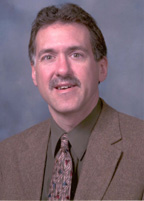 Keith Allen, Ph.D., isn’t likely to give the pre-doctoral interns that he mentors a lot of answers when discussing intervention strategies for patients.
Keith Allen, Ph.D., isn’t likely to give the pre-doctoral interns that he mentors a lot of answers when discussing intervention strategies for patients.
Instead, the UNMC clinical psychologist seeks to cultivate the future psychologists’ minds with in-depth dialogue and thought about why specific treatments are effective.
“I’m interested in encouraging interns to think. When you’re in a clinical profession, you have a tendency to be interested in the technology of solving people’s problems, and clients certainly want the solutions,” Dr. Allen said. “But I think that anyone at the Ph.D. level should want to know more than just the technology. They should know why something works and how it fits into a conceptual framework.”
Dr. Allen, a clinical psychologist in the Munroe-Meyer Institute and a professor in the department of pediatrics, will be one of three faculty honored with the UNMC Outstanding Teaching Award at the Annual Faculty Meeting. It will begin at 4 p.m. Monday, March 31, at the Eppley Science Hall Amphitheater.
Clinical setting
Most of Dr. Allen’s teaching comes in the clinical setting. He serves as the internship training coordinator for the pediatric psychology section of the department of pediatrics. In this role, he is involved in training students, residents and doctoral-level psychology interns. He also is co-director of the Nebraska Internship Consortium in Professional Psychology, the largest internship training program for psychologists in the United States.
Challenging minds
Dr. Allen said students seem to like being encouraged to think about why something works with a patient. He said he adopted his teaching style because he found it beneficial when receiving his doctoral education at West Virginia University.
“Many students seem to find it valuable,” Dr. Allen said. “Early on, the mentors that I found most pleasing to me were the ones who focused on developing my conceptual breadth as well as my technical skill. I found it valuable. As a result, I am also interested in having students think conceptually. And, I happen to think that the dialogue is fun.”
Seizing teachable moments
Rachel Valleley, Ph.D., an assistant professor of pediatrics at UNMC, learned under Dr. Allen as a pre-doctoral intern. She said he constantly looked for teaching opportunities and “seized the moment when an opportunity arose.”
“A couple times a month, Dr. Allen conducts case conferences as an instructional procedure that pushed each and every one of us to think about why we chose an intervention versus simply discussing how to do an intervention,” Dr. Valleley said. “Dr. Allen stresses the importance of understanding why an intervention is successful.”
Trademark style
Jodi Polaha, Ph.D., an assistant professor of pediatrics at UNMC, was another of Dr. Allen’s pre-doctoral interns. He also provided supervision during her postdoctoral fellowship, and they have jointly written five papers since she became a UNMC faculty member in 1999.
“Dr. Allen’s trademark is his careful, analytical style,” Dr. Polaha said. “He does not ‘hand out’ information, but encourages his students to think. I appreciate his sharpening this skill for me. It provides me the ability to generate more effective, pragmatic, treatment solutions for my patients, better-designed research protocols, and concisely worded manuscripts.”
The search for answers
Dr. Allen said that he enjoys coming to work at UNMC each day, in part because he is able to use so many of his skills. He combines his teaching with several clinical and research activities. He credits department chairman Joe Evans, Ph.D., with recruiting a group of “collegial, like-minded people” who use empirical research techniques to try to find answers to behavior disorders.
“We have individuals who share similar philosophies, who share an appreciation for science-based approaches, and who believe we can best understand why people do what they do by looking at their environment,” Dr. Allen said. “That doesn’t mean that we ignore biology, but we think that we help to change behavior and improve learning by modifying someone’s environment.”
Dr. Allen’s research
Dr. Allen’s research interests include autism spectrum disorders and pain management, specifically in pediatric dentistry and stress-related disorders. He serves on the state advisory council for autism. He devotes about half of his time to individuals with developmental disabilities.
His greatest teaching moments, he said, come when a student starts to think conceptually about a problem.
“I don’t always agree with their reasoning, but I see that they’re doing it, and that’s exciting,” Dr. Allen said. “I don’t care if interns don’t always agree with me, and in fact I’ve learned things from students whose conceptual understanding of human behavior isn’t just like mine.”
Family life
Dr. Allen and his wife, Paula, have three children, Kelsey, Garrett, and Haley.